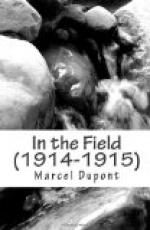All this time officials were running down the platform with papers in their hands, trying to read what was chalked on the vans. Enquiries and shouts were heard:
“Where is the bread?”
“Over here.”
“No, it’s not.”
“Where is the officer in charge?”
Matches were struck. The few lighted lanterns there were were snatched from one hand by another. And in spite of all this apparent disorder the work went rapidly forward. Men climbed in through the open doors. Sacks and heavy cases were passed along. Porters, bending under their loads, slipped through the maze of vans and carts to the one they wanted and deposited their burdens.
After giving Wattrelot orders to prevent any one from invading our horse-box I slipped out and went towards the station office to look for the military commissary. I had great difficulty in making my way through the crowd of men who seemed to be rushing to take the train by assault in the darkness. Then I had to avoid breaking my neck in getting across the maze of rails, the signal wires, and the open ditches.
I got to the station. A number of wounded were there lying on the platforms; about a hundred of them, with their clothes torn, and covered with dust. They presented a sad picture. They were, it is true, only slightly wounded; but it cuts one to the heart to see soldiers in that plight, hauled out upon the ground without straw to lie upon or any doctor to attend to them. However, they had all had first-aid dressings. Below the bandages that bound their heads their feverish eyes gleamed in the light of the lanterns. Their bandaged arms were supported by pieces of linen tied behind their necks. Several of them were sitting on baskets, casks and packages of all kinds, and they were talking eagerly. Each man was relating, with plenty of gesticulation, the great deeds he had taken part in or seen. As I passed, I heard scraps of their conversation: “They were in the first line of houses.... Then, old chap, our lieutenant rushed forward.... You should have seen them scuttle....”
I was delighted to see that the moral of those fine fellows didn’t seem in the least affected. To hear them you would have thought the Germans had been driven back at all points.
I got a porter to tell me where the military commissary was. He pointed out an Artillery lieutenant, in a cap with a white band, talking to a group of officers. I introduced myself, and asked him if he knew anything about the state of affairs. Like everybody else, he could only give me very vague information. “However,” he added, “I can confirm what you have heard about G. The First Corps has just retaken the town, which was defended by the Prussian Guard. It appears that our fellows were wonderful, and that the enemy has suffered enormous losses. However”—the lieutenant’s voice trembled slightly, and the shrug of his shoulders betrayed his despair—“I have orders to evacuate the station, with all my men and my papers, so soon as the last train has been unloaded. I am to fall back towards L. How is one to understand what all this means?”




